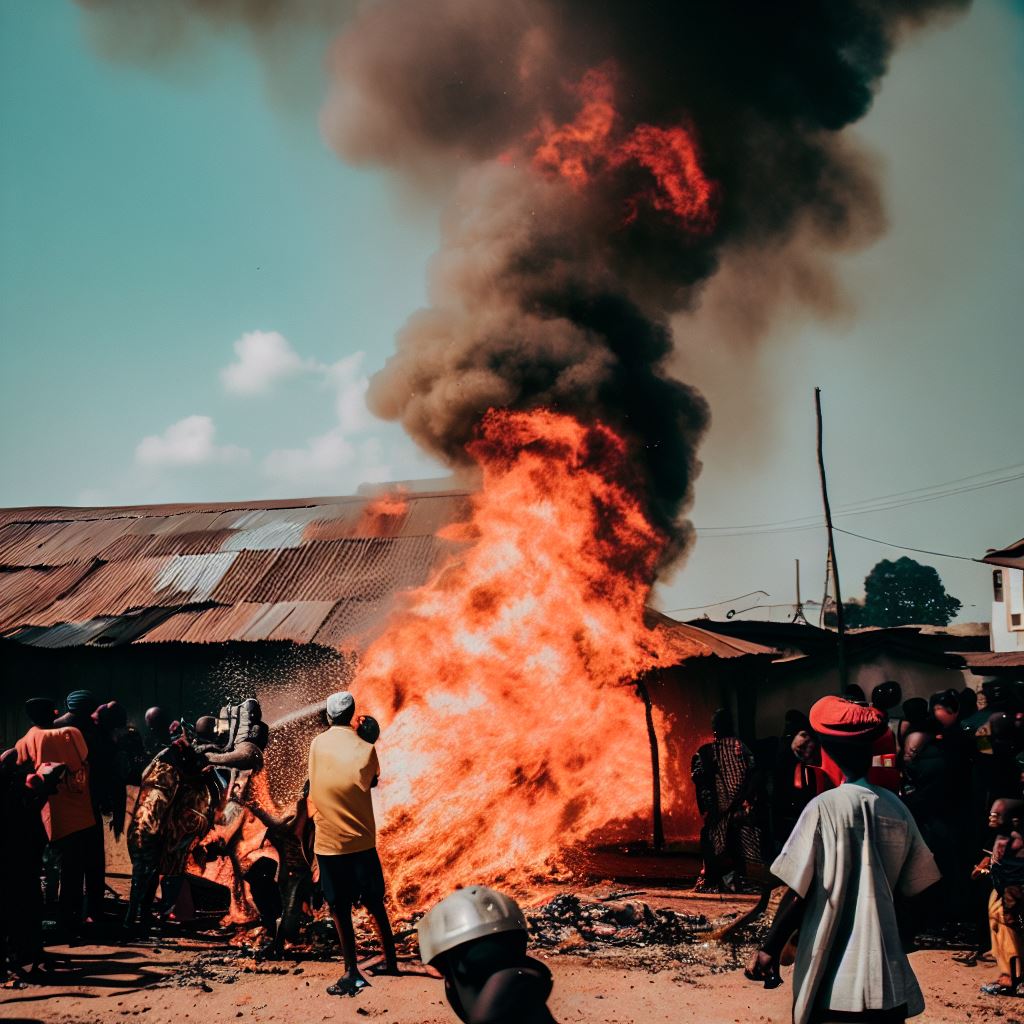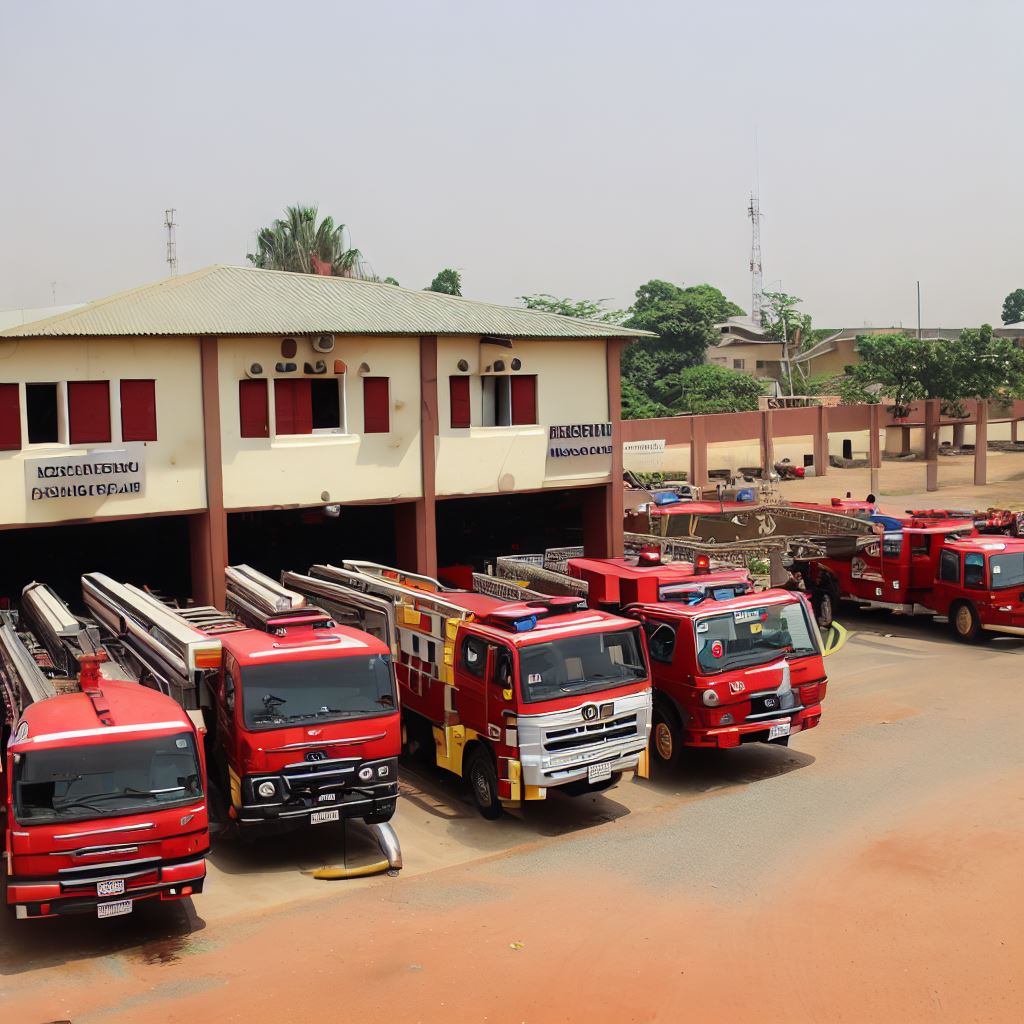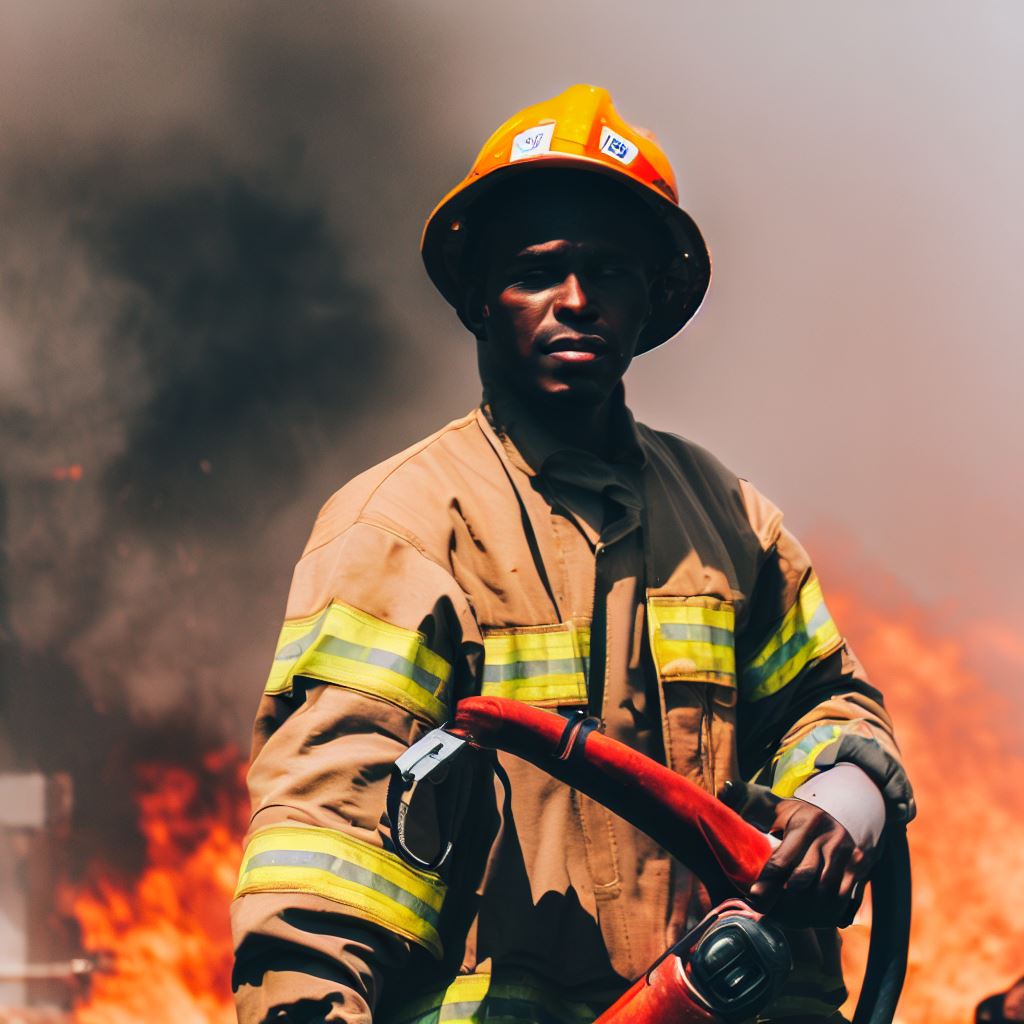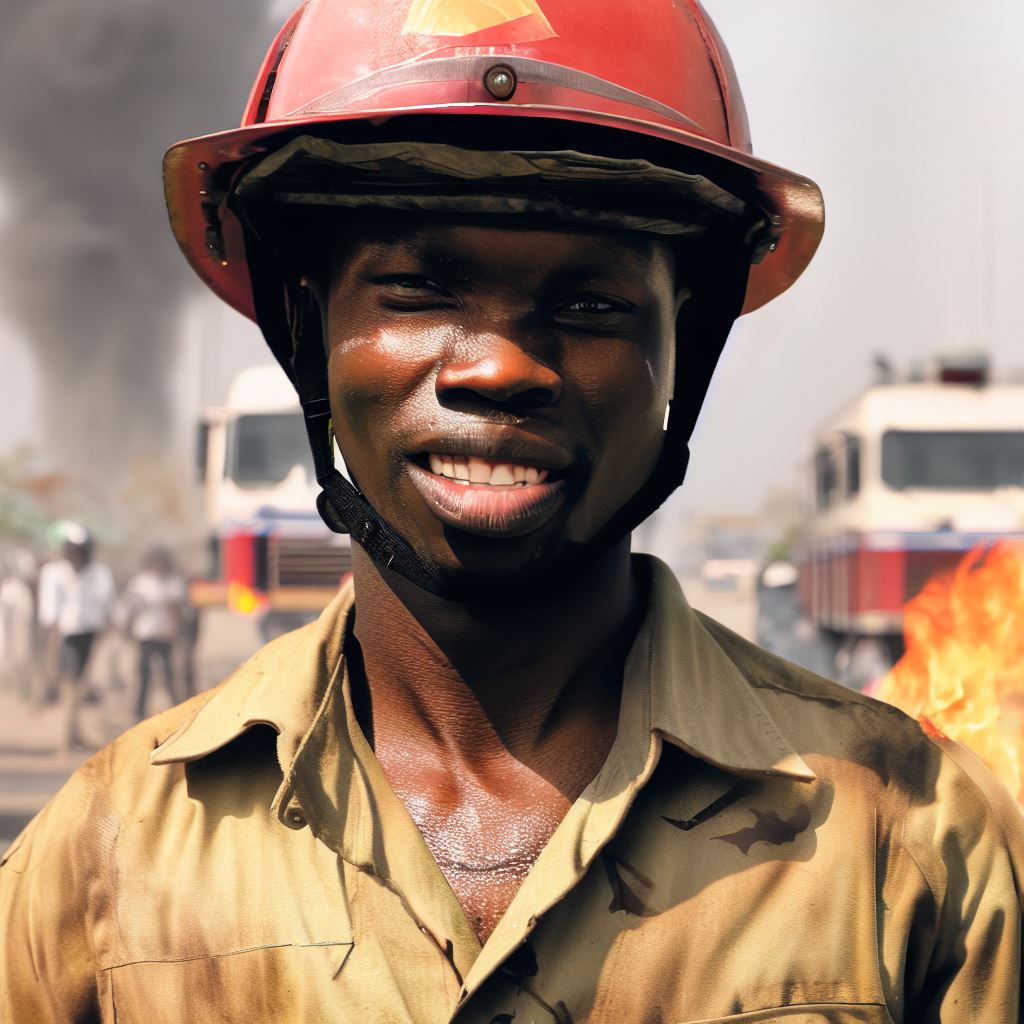Introduction
Firefighting in Nigeria is a pressing concern, demanding unwavering attention due to its far-reaching consequences.
In this blog post, we delve into the symbiotic relationship between fire fighting and community involvement, highlighting its pivotal role in averting and addressing fire incidents effectively.
The essence of community participation cannot be overstated.
Communities are the frontline defense against fires, possessing an intimate understanding of their unique risks and vulnerabilities.
Collaborative efforts, like fire safety education and local response teams, empower communities to proactively prevent fires and respond swiftly when they occur.
To grasp the full magnitude of effective fire prevention and response in Nigeria, it’s imperative to embrace the perspective that underscores the intrinsic link between fire fighting and community.
This synergy not only safeguards lives and property but also strengthens the fabric of Nigerian society.
Firefighting in Nigeria: An Overview
Firefighting in Nigeria is an essential yet challenging task that requires attention to fire safety regulations, infrastructure, and prevention measures.
This blog post provides an overview of the current state of firefighting in Nigeria, highlighting the existing challenges and the need for improvement.
A. State of fire safety regulations and infrastructure in Nigeria
In Nigeria, fire safety regulations and infrastructure are often inadequate, posing significant risks to individuals and communities.
The country lacks comprehensive fire safety laws and standardized building codes, resulting in a lack of enforcement and awareness regarding fire prevention measures.
Furthermore, most public buildings, including schools, hospitals, and markets, do not have proper fire safety equipment or emergency systems in place.
The absence of fire hydrants, fire extinguishers, and smoke detectors significantly hampers firefighting efforts, making it difficult to control and prevent fires.
The lack of fire safety regulations and infrastructure is further exacerbated by poor maintenance practices.
Many buildings in Nigeria lack routine fire safety inspections and maintenance of fire suppression systems, leaving them more vulnerable to fire incidents.
B. Challenges faced by the Nigerian fire service
The Nigerian fire service faces numerous challenges in its efforts to protect lives and properties from fires.
One of the primary obstacles is inadequate funding, resulting in a lack of modern firefighting equipment, training, and personnel.
The limited budget allocation for firefighting severely limits the resources available to respond effectively to fire emergencies.
Another significant challenge is the shortage of trained firefighters.
The Nigerian fire service struggles to recruit and retain skilled personnel due to low wages, limited career progression opportunities, and inadequate training facilities.
This shortage of firefighters hampers the response time and effectiveness in tackling fire incidents.
Additionally, the lack of public awareness and education about fire safety further complicates firefighting efforts.
Many Nigerians are unaware of basic fire safety measures, such as proper handling of flammable materials, evacuation procedures, and the importance of smoke alarms.
This ignorance increases the risk of fire outbreaks and makes it challenging for the fire service to prevent and mitigate fire incidents.
C. Need for improved fire prevention measures
Given the current challenges faced by the Nigerian fire service and the state of fire safety regulations and infrastructure, there is an urgent need for improved fire prevention measures.
Firstly, it is crucial to establish comprehensive fire safety laws and building codes that enforce the incorporation of fire prevention systems in buildings.
Regular inspections and maintenance of fire safety equipment should be mandatory to ensure compliance and minimize the risk of fire incidents.
Secondly, adequate funding should be allocated to the fire service to enhance their capabilities.
This includes investing in modern firefighting equipment, training programs, and competitive salaries for firefighters.
By providing the necessary resources, the Nigerian fire service can effectively respond to fire emergencies and protect lives and properties.
Lastly, public awareness and education campaigns about fire safety should be implemented on a large scale.
This can be achieved through partnerships between the fire service, educational institutions, and the media.
Promoting fire safety measures, conducting drills, and educating the public about the importance of fire prevention will help reduce the incidence of fire outbreaks and improve overall safety in communities.
In general, firefighting in Nigeria faces numerous challenges due to inadequate fire safety regulations, infrastructure, and prevention measures.
By addressing these issues and implementing improved fire prevention measures, Nigeria can enhance its firefighting capabilities and safeguard communities from the devastating impact of fires.
Importance of Community Engagement in Fire Safety
In the quest to prevent fires, community awareness and education are our most potent weapons.
By arming individuals with fire safety knowledge, we can drastically reduce the number of fire-related incidents.
Through community awareness programs, we empower people to spot and address fire hazards in their surroundings.
They learn the art of fire prevention and the importance of maintaining fire safety equipment.
When a community is vigilant, potential dangers can be promptly reported to authorities, stopping small fires from becoming major catastrophes.
Moreover, community engagement instills a sense of responsibility towards fire safety.
Training programs equip members with vital firefighting skills, enabling them to use fire extinguishers and implement evacuation plans.
This active participation not only reduces loss of life and property but also fosters unity and collaboration.
In essence, when communities unite in fire safety efforts, we build a resilient, safer society, ready to face any emergency that may arise.
Read: Freelancing as a Coating Technician: Opportunities in Nigeria
Cultural Factors Affecting Fire Safety in Nigeria
A. Traditional Practices and Their Impact on Fire Safety
In Nigeria, traditional practices such as the use of open flames for cooking and heating are common.
These practices increase the risk of accidental fires in homes and communities.
Furthermore, the lack of fire safety education and training exacerbates this risk.
Traditional cooking methods, such as using firewood or charcoal stoves, often lead to uncontrolled fires.
The limited availability and reliance on electricity also contribute to the use of open flames for everyday activities.
Overall, these traditional practices pose a significant challenge to fire safety in Nigeria.
B. Cultural Beliefs and Misconceptions Regarding Fires and Firefighting
Nigeria is rich in cultural beliefs and myths associated with fires and firefighting.
Many Nigerians believe that fire outbreaks are caused by supernatural forces or spiritual attacks.
This belief system often leads to neglecting basic fire safety measures and relying on spiritual interventions instead.
Misconceptions regarding firefighting, such as the effectiveness of traditional methods like pouring palm oil on fires, persist.
Contrary to scientific evidence, some cultural beliefs promote the notion that firefighting requires special rituals or incantations.
These beliefs and misconceptions hinder the adoption of modern fire safety practices and techniques.
C. The Need for Culturally Sensitive Fire Safety Campaigns
To address the cultural factors affecting fire safety in Nigeria, culturally sensitive campaigns are crucial.
Standard fire safety messages and techniques should be adapted to align with Nigerian traditions and beliefs.
Collaboration with community leaders, religious institutions, and traditional healers can help dispel myths and misconceptions.
Fire safety education programs need to be engaging, interactive, and tailored to the specific needs of each community.
Local languages, folklore, and storytelling can be utilized to effectively communicate fire safety information.
By integrating cultural elements into fire safety campaigns, they become more relatable and resonate with Nigerian communities.
Only by recognizing and addressing cultural factors can fire safety initiatives truly make a lasting impact in Nigeria.
In short, traditional practices in Nigeria, such as open flame cooking and heating, pose a significant risk to fire safety.
Cultural beliefs and misconceptions further compound this challenge by promoting ineffective firefighting methods.
To effectively tackle these issues, culturally sensitive fire safety campaigns that incorporate local traditions and languages are necessary.
By working hand-in-hand with communities and leveraging cultural practices, Nigeria can improve fire safety awareness and prevent devastating fire incidents.
Read: Market Analysis: Coating Technician Demand in Nigeria 2023

Case Studies: Community-led Firefighting Initiatives
A. Real-life Examples of Successful Community-led Firefighting Efforts in Nigeria
- Otodo Gbame: In this Lagos community, residents formed a fire brigade and received training on fire safety measures.
- Sabo-Yaba: The community established a volunteer-based emergency response team specialized in firefighting techniques.
B. Strategies Implemented by Communities to Enhance Fire Safety
- Establishing Community Fire Brigades: Communities create their own firefighting units to respond quickly to fire incidents.
- Collaborating with Local Authorities: Engaging with fire departments and government agencies for training and resources.
- Conducting Fire Safety Awareness Campaigns: Communities educate residents on fire prevention, evacuation plans, and safety measures.
- Regular Fire Drills: Organizing mock fire drills to enhance preparedness and familiarize residents with emergency procedures.
- Ensuring Fire Safety Equipment Availability: Communities invest in firefighting equipment such as extinguishers and hoses.
- Encouraging Building Safety Measures: Advocating for the installation of fire-resistant materials and regular inspections of buildings.
C. Positive Outcomes Achieved through Community Involvement
- Quick Response Time: Community-led firefighting initiatives enable rapid response, helping to minimize fire damage.
- Reduced Loss of Life: Fire safety education and well-prepared communities decrease the likelihood of casualties.
- Fire Incident Containment: Communities trained in firefighting tactics can effectively control and suppress fires before they spread.
- Improved Fire Safety Infrastructure: Community efforts result in better availability and accessibility of firefighting resources.
- Strengthened Community Bonds: Collaborative firefighting initiatives foster solidarity and unity among residents.
- Increased Awareness and Preparedness: Involving communities in fire safety leads to a higher level of preparedness throughout Nigeria.
Note: It is essential to remember that these initiatives may not entirely replace professional firefighting services.
Engaging with local authorities and fire departments should always remain a priority to ensure comprehensive safety measures.
By actively involving communities in firefighting efforts, Nigeria can reinforce fire safety practices, establish reliable emergency response systems, and create resilient neighborhoods.
These case studies exemplify the power of community-led initiatives in successfully tackling fire incidents.
Read: Sustainability: Eco-Friendly Coating Practices in Nigeria
Government Initiatives and Partnerships
A. Role of the Nigerian Government in Promoting Fire Safety
The Nigerian government plays a crucial role in promoting fire safety within the country.
- The government enforces fire safety regulations and standards to ensure compliance.
- It establishes fire departments equipped with modern firefighting equipment and trained personnel.
- The government invests in the development of firefighting infrastructure, such as fire stations and hydrants.
- It educates the public about fire prevention measures through awareness campaigns and initiatives.
- The government promotes the use of fire-resistant building materials and designs in construction projects.
B. Importance of Partnerships Between the Government and Communities
Partnerships between the government and communities are essential for effective fire safety management.
- Collaboration allows for the pooling of resources, expertise, and knowledge to address fire-related challenges.
- These partnerships empower communities to actively participate in fire safety initiatives.
- Joint efforts can lead to improved communication channels and coordination during emergencies.
- Communities can provide valuable insights and local knowledge to enhance government strategies.
- Partnerships foster a sense of ownership and responsibility among community members towards fire safety.
C. Examples of Collaborative Efforts Between the Government and Local Communities
Several initiatives showcase successful collaborations between the Nigerian government and local communities.
- Public-Private Partnerships (PPP): The government partners with private organizations to establish and maintain fire safety infrastructure.
- Community Fire Brigades: Government trains and supports community members to form local fire brigades, enhancing emergency response capabilities.
- Fire Safety Awareness Programs: The government teams up with community organizations to conduct training sessions, workshops, and drills to educate individuals on fire safety practices.
- Fire Safety Committees: Government collaborates with community leaders to form committees responsible for ensuring fire safety compliance in residential areas and public spaces.
- Rescue and Relief Collaborations: The government works together with local communities to provide swift rescue and relief services during fire disasters.
In fact, the Nigerian government plays a crucial role in promoting fire safety through various initiatives and partnerships.
By enforcing regulations, investing in infrastructure, and raising awareness, the government actively works towards reducing the risk of fires.
Partnerships with communities empower individuals to actively participate in fire safety measures, fostering a collaborative approach.
Successful collaborations between the government and local communities have led to improved emergency response capabilities and overall fire safety in Nigeria.
Recommendations for Strengthening the Nigerian Firefighting Community
A. Ways to improve fire safety regulations and infrastructure
- Strengthen and enforce existing fire safety regulations in Nigeria to ensure compliance.
- Implement stricter inspections and penalties for non-compliance with fire safety regulations.
- Establish a centralized database to track fire safety compliance for all buildings and structures.
- Upgrade and modernize fire infrastructure, including fire stations, equipment, and vehicles.
- Invest in advanced fire suppression technologies such as automatic sprinkler systems and fire-resistant materials.
- Collaborate with international organizations to learn best practices and adapt them to the Nigerian context.
B. Methods to enhance community involvement and awareness
- Conduct public education campaigns to raise awareness about fire safety and prevention.
- Organize community events and workshops to educate residents on fire safety measures.
- Encourage the formation of community-based volunteer fire response teams.
- Establish community fire safety committees to oversee prevention efforts and emergency preparedness.
- Foster partnerships between the firefighting community and local schools to educate children on fire safety.
- Engage local media outlets to promote fire safety messages and share success stories.
C. Increased training and resources for the Nigerian fire service
- Develop comprehensive training programs for firefighters, focusing on both technical skills and leadership.
- Provide ongoing professional development opportunities to ensure firefighters stay updated on the latest techniques.
- Collaborate with international firefighting organizations to offer training exchanges and knowledge sharing.
- Allocate sufficient funding to the Nigerian fire service to improve resources and equipment.
- Establish a scholarship program to attract and retain talented individuals in the firefighting profession.
- Strengthen partnerships with other emergency response agencies to enhance coordination and effectiveness.
In review, strengthening the Nigerian firefighting community requires a multi-faceted approach.
By improving fire safety regulations and infrastructure, enhancing community involvement and awareness, and advocating for increased training and resources, Nigeria can significantly enhance its firefighting capabilities.
These recommendations aim to create a safer environment for all Nigerians and minimize the devastating impact of fires on communities.
Together, we can build a resilient and proactive firefighting community in Nigeria.
Read: Government Support: Policies for Coating Techs in Nigeria
Conclusion
In this blog post, we delve into the intertwined realms of fire fighting and community in Nigeria.
Understanding the unique Nigerian perspective on fire safety is paramount.
Fire incidents are not mere accidents but catalysts for collective resilience. Communities in Nigeria are tightly-knit, often forming the first line of defense in emergencies.
Traditional knowledge blends seamlessly with modern techniques to tackle fires, underlining the importance of cultural context.
To ensure a safer environment, proactive measures are imperative. Public awareness campaigns, community drills, and equipping local fire brigades are pivotal steps.
By fostering community engagement, we empower individuals to be vigilant guardians against fire hazards.
In the end, the fusion of traditional wisdom, modern strategies, and community solidarity will pave the way for a safer Nigeria.




